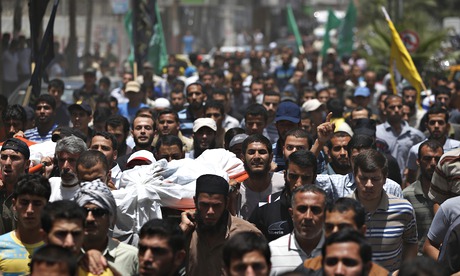
Palestinian mourners carry one of the four bodies of members of the al-Astal family, who were killed by an Israeli airstrike. Photograph: Lefteris Pitarakis/AP
The house of the Antez family in Sha'af looks undamaged from the outside. But the men milling around it have the dazed faces of grief that tell a different story.
Inside, the hole punched by the tank shell that hit the house, after clearing the retaining wall, is visible about 3m (10ft) off the ground.
It seems a small thing – a hole the size of a toaster. But the shell travelled through four walls, scattering pieces of shrapnel that have been gathered and placed to one side.
There were 60 people from three families sheltering inside, some under the stairs, some in a corridor leading to a half-finished room.
Following the shell's path through the house, three pools of blood punctuate where three people died – two of them children.
Salem Antez, 29, approached with a purple plastic bag and opened it, its contents terrible.
"This is my son," he said and nothing else, tears tracking down his face. Mohammad, another family member explained, was two. The other dead were Abed Ali, 24, and Mohammad Ibrahim, 13. Salem bent back to his task – his bag becoming a little heavier. "They hit us at 8.45pm," an uncle said. "We had just finished our Iftar meal and were gathered here for safety."
The morning after the night of the artillery barrage that launched Israel's ground offensive into Gaza drew back the veil on the consequences – a bleak procession of the dead and injured from the coastal enclave's south through its eastern border regions up to the north.
The deaths in the Antez family came as Palestinian health officials said 27 Palestinians, including a baby, two children and a 70-year-old woman, had been killed since Israel poured ground forces into the densely-populated strip of 1.8 million Palestinians on Thursday night.
Across Gaza's neighbourhoods on Friday morning, the sound of shell fire and bombing continued, as naval gunboats, which had been shelling the coast, moved closer to the shore.
Outside his house in Zeytoun – one of 14 neighbourhoods told to evacuate civilians by 8pm on Thursday night – Fouad Hananah said artillery had hit the street only five minutes before. His home is only 1.2 miles (2km) from the border with Israel.
"A lot of families left two days ago. From my window you can see the border. We could hear the sound of the Israeli tanks and see the dust they make when they are moving," Hananah said.
"Last night was terrible. The shelling didn't stop and we could see tracer fire as the soldiers came in."
"I put all the family in one room," said one of his neighbours, Mohammad Ashour, 55. "The children were crying and asking if they were trying to hit the house."
Even closer to the border is the Hamas-run al-Wafa hospital, a rehabilitation centre for the severely ill. On Friday – the road outside showered in glass and concrete – it finally evacuated its 17 patients, health staff and a group of foreign human shields, after coming under fire during the bombardment. At the door two paramedics said the hospital was locked, with entry now forbidden.
Further north, in Beit Lahia, the Kamal Adwan hospital is still operating, even as the sound of continuing explosions reverberates in the distance. This area also felt the brunt of the initial assault.
An ambulance pulled up and its door opened, revealing more dead children, two stacked together on a single stretcher, scorched and mutilated.
They were taken to a small ward where another body already lay covered in a blanket. Once names were supplied the ruined shells of people became human: three children from the Musallem family, Mohammad, 15, Walla, 13, and Ahad, 11 – killed in their bedroom by a tank shell in the village of Al Nada Tawas, close to the Erez border crossing.
Mohammad Zahar, the ambulance driver who brought them in, said the girl, Walla, was alive when he picked her up but died on the road to the hospital.
"I went out 40 maybe 50 times in the night last night, mainly to rescue people from the smoke." He has barely slept in the last three days.
Their mother, Muna, arrived soon after with her three surviving children. They sat on the hard plastic chairs in casualty and cried, united in a place impenetrable for now by words of consolation.
No comments:
Post a Comment